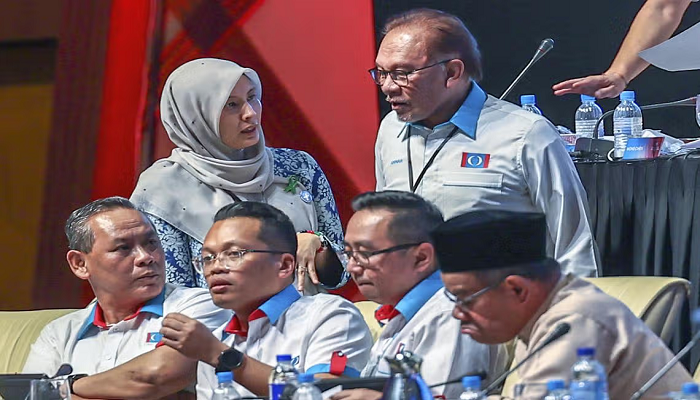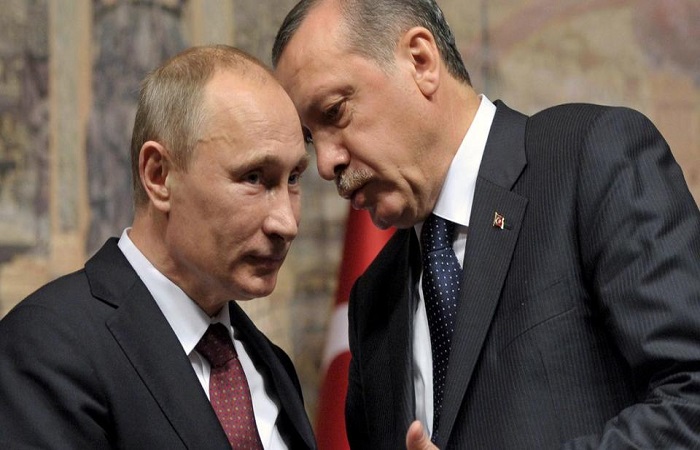Malaysia’s ruling party, Parti Keadilan Rakyat (PKR), faces internal upheaval as Prime Minister Anwar Ibrahim’s daughter launches a bid to unseat Deputy President Rafizi Ramli in upcoming party elections.
The move, seen by critics as a power consolidation attempt, has intensified accusations of nepotism within PKR, which was founded 26 years ago on reformist ideals. As the contest heats up, the outcome could reshape the party’s leadership dynamics and Anwar’s political legacy.
The move has sparked talk not only of dynastic politics but also hypocrisy, given PKR’s own record of accusing Malaysia’s longest-serving leader Mahathir Mohamad of favouring his children in politics and business.
Founded in 1998 as the political vehicle to defend Datuk Seri Anwar soon after his sacking as Malaysia’s deputy prime minister, PKR has seen its president win a third term uncontested – his first as the country’s prime minister but also his final three-year stint, according to party rules.
Thus, the question of succession has come into focus in the leadership polls that were supposed to be a relatively benign affair. Mr Anwar and his allies had until March proposed that the top two posts go uncontested.
Xi Calls for Asian Unity Against Protectionism During Malaysia Visit
But the keen battle for the No. 2 position after Ms Nurul Izzah Anwar’s entry and controversy over shock losses suffered by a string of candidates aligned to Mr Rafizi, 47, in recent divisional elections, have destabilised PKR and the multi-coalition government it leads, after a relatively calm two-year period for Malaysian politics.
Economy Minister Rafizi has himself upped the ante with threats to quit the Cabinet, both prior to the May 23 vote and if he fails to defend the deputy presidency he won just before the 2022 general election. At that party polls, his slate of candidates took the lion’s share of central leadership positions against those seen to be endorsed by Mr Anwar.
Mr Rafizi is widely credited as a key strategist behind the Pakatan Harapan coalition winning the most seats at the national polls in 2022, having been drubbed at four state elections in the previous two years.
There have also been uncomfortable whispers of money changing hands at this party polls – this, for a party that once boasted about reformist credentials that would sweep away cronyism and corruption, with Ms Nurul, 44, dubbed its Puteri Reformasi (Reform Princess).
“The suddenly competitive race for deputy president has thrown up issues that had, in many ways, been swept under the carpet,” S. Rajaratnam School of International Studies senior fellow Ariel Tan told The Straits Times, citing “the party’s seemingly moribund reform agenda and questioned commitment to fighting corruption” as well as “rumours of worsening money politics in party elections”.
The choice between former MP Nurul Izzah and Mr Rafizi has left the 30,000 voting delegates between a rock and a hard place in deciding the future of their party. Some 10,000 of the delegates are gathering for the party’s congress between May 22 and 24 in Johor Bahru.
In the ongoing battle for the soul of PKR, both deputy president candidates have positioned themselves as the champion for reforms. Ms Nurul has even criticised the extension for controversial anti-graft chief Azam Baki – which is ironic given how her father has sole discretion to decide on his tenure – while Mr Rafizi has been the most vocal in calling for the head of the Malaysian Anti-Corruption Commission to be removed during the 2022 general election campaign.
“For years, (PKR) promised internal democracy, merit-based leadership, and a platform for progressive change. Two decades on, however, those ideals are facing an uncomfortable reckoning,” said Universiti Malaya’s associate professor of international and strategic studies Khoo Ying Hooi.
Malaysiakini fine raises concern among Pakistani Journalist society
“Assessments of (Nurul’s) leadership potential vary, as is often the case in politics. But it is precisely because of her surname that any potential ascent to party leadership will inevitably be scrutinised. Fairly or not, her candidacy would be read through the lens of dynastic succession,” she added.
Each candidate has his or her respective strengths, but pitfalls await the Anwar administration whoever wins. If Ms Nurul succeeds, then the opposition will likely ride on accusations of nepotism against the Premier, given the scathing remarks against her candidacy across social media.
This would also be exacerbated by claims from Mr Rafizi’s camp of an “uneven playing field”, said ISEAS – Yusof Ishak Institute’s Malaysia programme director Francis Hutchinson, coming after the divisional elections that were marred by claims of rigging. The claims of irregularities, including money politics, largely came from candidates aligned to Mr Rafizi.

“(A Rafizi win) would be less damaging for the party in the short term, and would probably entail business as usual for a while,” he told ST.
“However, a resounding result for Rafizi could lead to more internal issues in the longer term (and) that the rather complicated dynamics between the two men continue,” he added, referring to the tensions between Mr Anwar and his deputy.
Veteran Malaysian politician plans new party to get majority Malay support
Mr Anwar had accepted PKR’s wish for Mr Rafizi to play an active role and lead its election strategy for the 2022 general election, but is seen as being keen now to take greater control of the party again. Having expended a great deal of resources keeping disparate ruling partners such as Umno and Gabungan Parti Sarawak, which dominates the eastern state, happy, the Prime Minister could do with a more pliant PKR.
According to party rules, Mr Anwar cannot remain as president beyond this uncontested third term, during which the next general election will be held, thus bringing into sharp focus the question of succession.
Said Ms Tan: “If Izzah wins, Anwar would have further strengthened his control of the party. Tighter control in the run-up to upcoming state elections in Sabah (in 2025), then Melaka and Johor would strengthen Anwar’s bargaining position. However, he would have to ensure that they retain the best candidates in the process as well.”
Another race being watched by observers is for the four vice-presidencies, as this will help assess how much support Mr Anwar’s allies have and whether they can control what Dr Hutchinson called an “amorphous structure” in PKR’s factional nature.
At least three of the incumbents – two Cabinet ministers and a state chief minister – are aligned to Mr Rafizi, but the rise of Deputy Entrepreneur Development and Cooperatives Minister Ramanan Ramakrishnan could break this stranglehold. The MP for a Selangor ward, seen as an Anwar operative and troubleshooter, has been forced to deny claims of “money politics” that are hurting the premier’s anti-graft messaging.
Cracks down on video-making in Malaysia, opposition says its attack on free speech
“Whoever wins, the rise of money politics has already been highlighted, to the discomfort of both PKR members and supporters. It would not be the only determinant of votes. Some delegates would understandably wish to be with the winning side with the powers and privileges of incumbency,” said Ms Tan.
“It would be interesting to see if the candidates who are seen as aligned with Rafizi would be targeted, or left alone to compete on a level playing field. If gestures are made to accept them even if Rafizi falls, this would help PKR retain the maximum number of young talents.”



